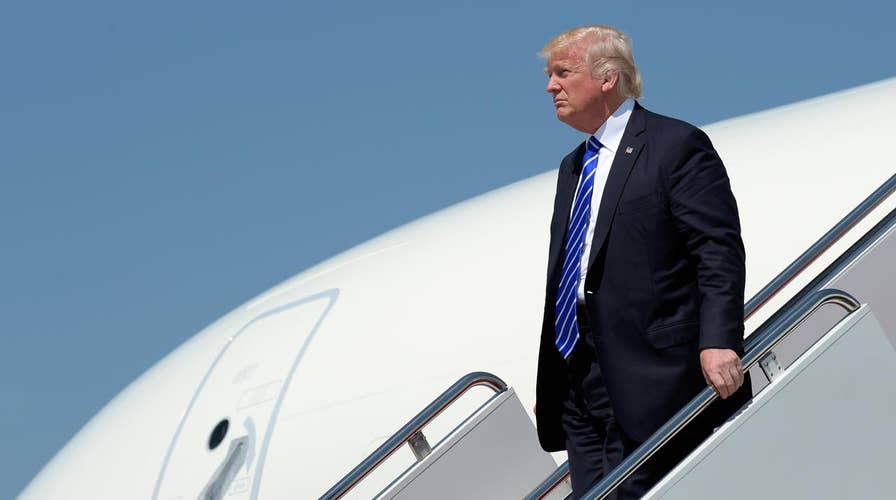Trump's itinerary for first overseas trip: What to expect
Donald Trump is embarking on his first overseas trip as president. Here's a look at the top items on his itinerary
Before his surprise election as nation’s 45th president, private citizen Donald J. Trump rarely left home. Travels abroad were usually brief and focused on clinching a property deal or ceremonial ribbon-cutting at a new hotel or golf course bearing his name.
Mr. Trump made no secret of the fact that he is a homebody who likes sleeping in his own bed -- be it at Trump Tower on Fifth Avenue n New York, or at Mar-a-Lago, his Palm Beach “winter palace” which he visited 7 times in his first 100 days as president.
Given the self-inflicted chaos and political crisis surrounding him in Washington, D.C., however, never has the prospect of foreign travel seemed so alluring. “There can be no better time to get out of Dodge,” said an aide planning logistics for the trip.
On Friday afternoon, Mr. Trump is scheduled to start his first foreign foray– a nine day, five city excursion whose length and intensity he has already attempted, unsuccessfully, to shorten.
The trip, billed as an opportunity for him to explain his “America first” agenda, will also offer his besieged White House aides a much relished chance to change the political subject.
Some aides welcome but fear this trip. Will their commander-in-chief stay on script? Will he insist of tweeting, or making impromptu comments and asides that could spark an international incident?
Controversy seems to follow Mr. Trump like a proverbial summer storm cloud. Potential foreign policy breakthroughs, but also disasters loom in every time zone, beginning with Saudi Arabia, his first stop. Even that choice has proven problematic. While White House aides hope to seal a huge package of arms deals and financial investments aimed at enhancing security and economic cooperation with Riyadh, some Israelis are quietly, and not so quietly annoyed that Mr. Trump’s first stop will be in an Arab country that is no longer their explicit foe, but is not quite their ally either. Mr. Trump is scheduled to give what is billed as a major speech on Islamic radicalism, a delicate topic in a kingdom which for many years financed and promoted Wahabi Islam, among the most strict, reactionary interpretations of their faith. The Israeli press has also been filled with stories about the kingdom’s denial of visas to two Washington-based Israeli journalists.
Mr. Trump’s truncated itinerary in Israel has also been problematic. A planned speech at the historic desert fortress of Masada, where Jewish soldiers committed suicide rather than be conquered by the Romans, was nixed after the Israeli air force decided a helicopter landing was too dangerous at the UNESCO-listed archeological site, and White House officials refused to take cable cars to the summit instead. Masada was also viewed as an inauspicious place for Mr. Trump to be discussing the prospects of peace between Israelis and Palestinians. Israeli right-wing groups are upset that Mr. Trump, like virtually all of his predecessors, seems disinclined to honor his campaign pledge to move America’s embassy to Jerusalem. Arab leaders with whom his administration has been trying to re-establish close ties to fight the Islamic state and counter Iranian ambitions in the region, warned that moving the embassy would spark violence and ruin prospects for a peace deal.
Nor are they thrilled about Mr. Trump’s desire to meet Palestinian Authority President Mahmoud Abbas in Bethlehem. Few Middle East analysts think that Mr. Trump’s desire to reopen peace talks between Israel and the Palestinians will bear fruit. “But the Middle East is a place of miracles, so who knows? Maybe there will be one,” said Abe Foxman, former head of the Anti-Defamation League.
At the NATO summit in Europe and other designated European stops, , Europeans are waiting to see whether Mr. Trump will retract his earlier denigration of NATO as useless and antiquated. Mr. Trump has already spent considerable time reversing his campaign pledges and positions. China is no longer a currency manipulator, as he once charged. Solving the challenge of North Korea’s nuclear program was “harder” than he initially thought . And he no longer talks about cancelling the nuclear deal with Iran, which he had denounced as the “worst” deal ever negotiated.
Mr. Trump also plans to squeeze in a quick meeting with Pope Francis. Though the two men have disagreed sharply about such issues as Mr. Trump’s Muslim ban and the treatment of refugees, Pope Francis has reserved judgment on the American leader, saying he never speaks negatively about someone he’s never met.
Finally, the president will address the Group of Seven economic powers in Italy.
Former Secretary of State Madeleine Albright, a Democrat, said recently that she hoped Mr. Trump would not make as many mistakes abroad as he has made at home. “I hope that there is not one single tweet about anything in the nine days he is gone," she said. That would be a relief.





















